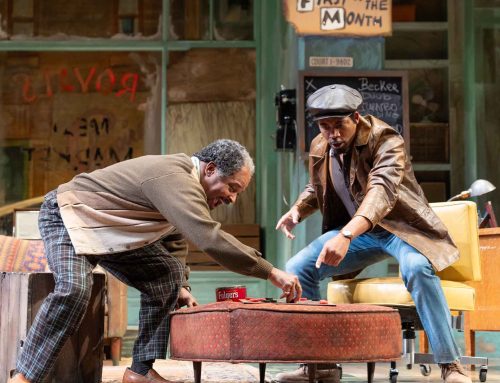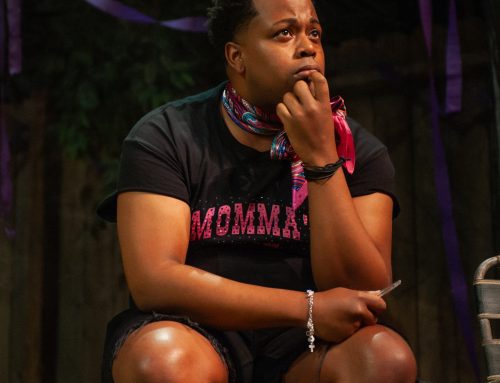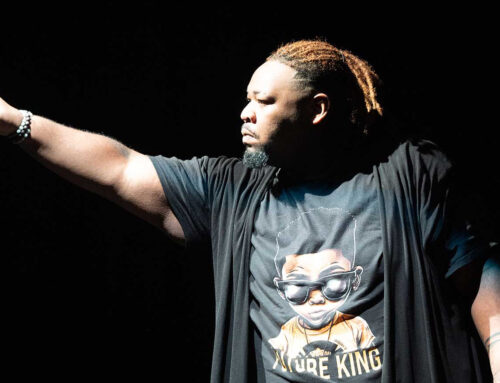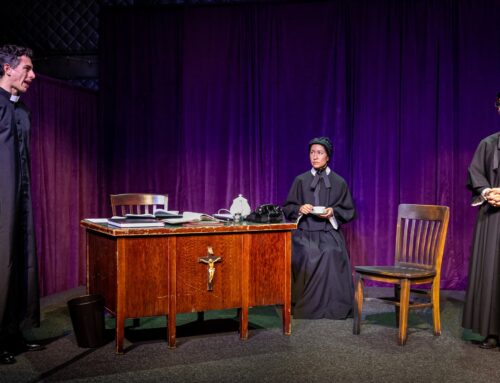at the Oregon Shakespeare Festival

conceived and developed by Jonathan Moscone and Tony Taccone
written by Tony Taccone
directed by Jonathan Moscone
When Oregon Shakespeare Festival announced it was commissioning a play on the shooting of Harvey Milk and George Moscone I was half pleased that gay civil rights would be a topic mentioned in the festival’s 37-play United States History Cycle and half apprehensive about seeing another cover of the Milk assassination already spotlighted very well in Execution of Justice and in the movies The Times of Harvey Milk and Milk.
My assumptions about the play topic set me up perfectly for Ghost Light.
This world premiere production is the story of Jonathan Moscone, a 12-year old boy whose famous and powerful father is killed and whose memory is immediately given short shrift. Mayor Moscone was the assassin’s primary target yet the world’s reaction to, and memories of, the murders focus almost exclusively on Harvey Milk as a gay martyr. Jonathan grows up to be gay himself and cannot come to terms with his father’s death and the lack of collective memory of George Moscone. He’s angry at Milk.
The general plot outline would be strong, innovative fiction. Except, of course, these historical events are real. I found myself agreeing with the Jonathan on stage, understanding how Jonathan was desperate for people to acknowledge that Mayor Moscone really was the more important victim that day. And, how could the child/man Jonathan ever sort out his feelings about his father, politics, and especially gay politics?
The story’s conceit is the adult Jonathan is, as in real life, a theater director. His current assignment is Hamlet, and he’s at a full stop in creating a vision for the play because he cannot figure out how to handle the ghostly apparition of Hamlet’s father. This creative block gives Jonathan and the other characters the chance to relate, remember, and dream their story of the assassination and its targets.
At intermission, I was very afraid that the story was so San Francisco-specific that much of its impact would be lost within 10 miles from City Hall. There was a lot of Gayness in Jonathan’s life, work, and conversations, too. Too much San Francisco, maybe, for non-queer folk?
The brilliant scenic design by Todd Rosenthal made it easy to feel that we were in a very San Francisco space. The opening video of Diane Feinstein announcing the murders is a piece that us City residents of a certain age can recite from burned-in memory, and its play on the on-stage televisions was chilling. The open set let us be in Jonathan’s living room with him. Then we could spy on him in his bedroom on a raised area in the back of the mostly static stage. And, Jon’s personal space blended into an upstage doorway that is a duplicate of the entrance to San Francisco City Hall.
The creators let me worry that they were writing only about a San Francisco cataclysm. As the second act progressed, it was clear that we were thinking about loss, fathers, and fears.
Some of the awfulness doesn’t show up in everyone’s life, fortunately. Apparently 12-year old Jonathan was in therapy at the time of his father’s murder. Why? Because Jon had a debilitating irrational fear that his father was going to be murdered. Ouch.
Fortunately for the pacing, there’s a lot of humor among the pathos. Some is pure well-written snappy lines. Others are cringe-inducing wounds such as Jonathan remembering an attending paramedic asking his name and then asking if Jon was related to the the parking garage. Funny. But, not.
At the curtain, Ghost Light had captured me and most of the audience. It got us wondering and talking. After the theater, my husband and I spent the next hour and a half on the sunny deck of the local cocktail lounge with friends from Seattle remembering our fathers, uncles, family, and politics. We laughed, we criticized, we teared up. Thank you, Ghost Light and good job!
Christopher Liam Moore as Jonathan saved the character from being a screaming queen stereotype which I think could have resulted from a less nuanced understanding of the story. Moore is on the short list of actors I’d pay to see read the telephone book, and in this performance he guides the audience into Jon’s conflicts, contradictions, and revelations with clarity and style. Jon is too big a character to hand to an actor less restrained and purposeful than Moore. He gave a great performance.
Another key to our afternoon was the flawless effort by Tyler James Myers as the 12-year-old Jon. I believed everything he said and every look he gave. A friend said that Myers was weak when she saw the play, but there was nothing to complain about when we went.
Bill Geisslinger portrayal of the murky and mutating prison guard, grandfather, and ghost was spot on. Like the script, Geisslinger set me up by being too heavy and obvious in the early scenes only to trick me into appreciating his transformation as the scenes wore on. Anyone who saw George Moscone is going to be creeped out by Geisslinger’s impersonation in the ending scenes.
Derrick Lee Weeden as “Mister” turned in a credible job in delivering lines and movement for a character none of us could understand. I don’t think the opaqueness was Weeden’s fault.
Actors in the smaller roles were superb, too. Danforth Commins (“Loverboy”) was perfectly toned, tight, and a help to the story. I suppose I didn’t mind the hot kiss he and Moore engaged in, although it got me off track during the performance as I valued it for prurient reasons and then considered how surprised I still am seeing a straight actor do a gay love scene. I digressed. Happily.
Ted Deasy (Basil), Peter Frechette (Film Director), and ensemble members Isaac Kosydar and Danielle Chaves gave fine performances, too. I was some what unconvinced by Robynn Rodriguez as Louise, Jon’s friend who acted as his professional and emotional supporter. She seemed to have too, too many lines to say and at times seemed most interested in getting through the words of the speech.
Weeden’s and Rodriquez’s situations are understandable in the first production of the newly written play. Ghost Light will benefit from tightening and focusing. There’s a powerful story there, and it’s developed artfully and written well. But, there’s also three endings that we go through sequentially, and excessive symbolism, and stubs of sub-plots that probably had more meaning before other scenes were cut in development.
We’re looking forward to Ghost Light’s next presentation at Berkeley Repertory Theater in January, 2012.
Ozdachs Rating: ![]()





Leave A Comment